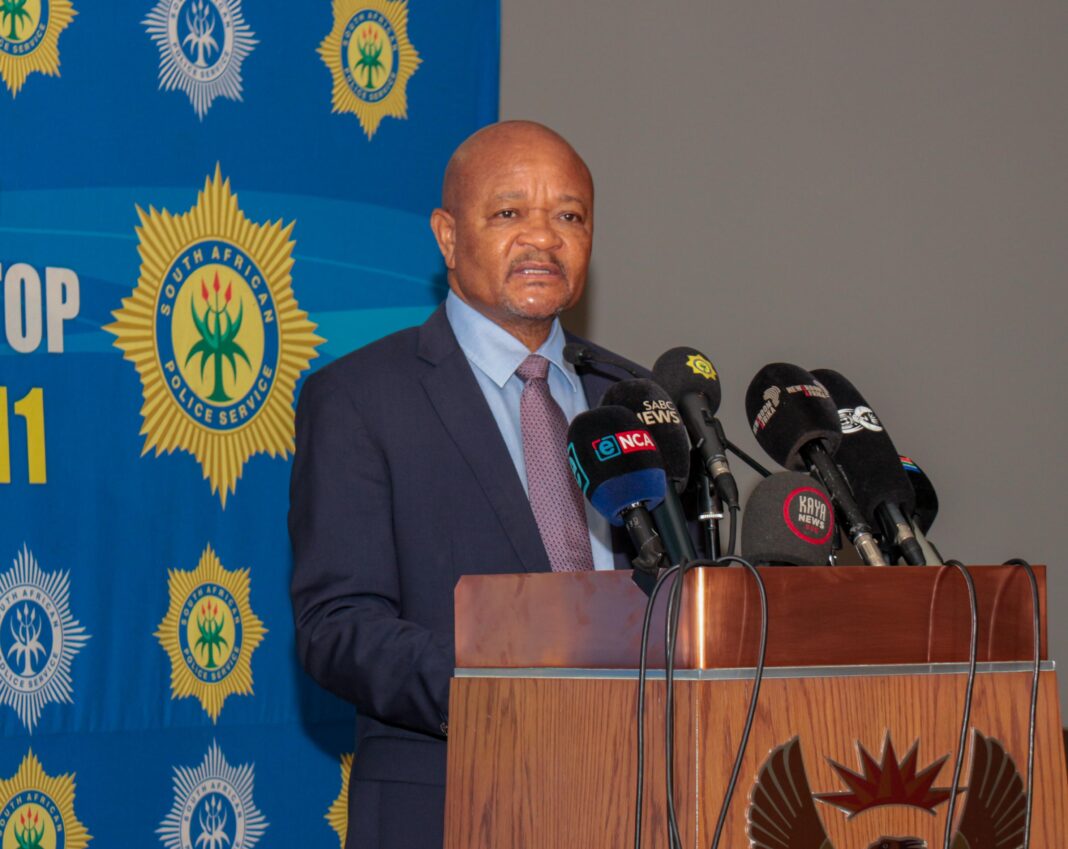By Akani Nkuna
Police Minister Senzo Mchunu has announced a notable decline in crime rates for the third quarter, highlighting positive progress in national security efforts.
He attributed the decrease to enhanced law enforcement strategies, community cooperation and targeted crime prevention initiatives. The latest statistics reflect a promising shift toward a safer society.
“The statistics we present today show a significant shift in our national crime landscape. Encouragingly, we have observed an overall decrease in several categories of crime. When compared to the same period in the previous year,” said Mchunu.
Addressing the media on Friday, Mchunu said murder had declined by 9.8% and rape by 3.3%.
Attempted sexual offences fell by 3.2%, and the was a decrease hijackings and robberies, at both residential and commercial properties.
“We have also registered a 4.5% reduction in stock theft, which is a welcome relief for farmers, communities and the agricultural sector as a whole. This positive shift highlights the importance of continued collaboration between law enforcement, local leaders and communities to safeguard this vital industry,” he added.
All provinces reported a decline in murder cases, marking a major achievement in crime reduction. However, Gauteng and KwaZulu-Natal remain the highest contributors, accounting for 25.0% and 21.4%, followed by the Eastern Cape at 18.9% and the Western Cape at 17.4%.
Rape cases have risen in KwaZulu-Natal, Mpumalanga and the Free State, while other provinces saw declines. Mchunu said that this highlighted the ongoing challenge of gender-based violence, emphasising the urgent need for strengthened interventions and continued efforts to protect vulnerable individuals.
Major-General Thulare Sekhukhune stated that this marked the most significant decline in murder cases since Covid-19 restrictions were lifted, making it the highest decrease recorded across all quarters since the end of pandemic-related limitations.
“We have managed to reduce the murders by 757, sexual offences 311, attempted murders by reduced by 261, common robbery by 796, robbery with aggravating circumstances by 530,” said Sekhukhune.

Burglaries at non-residential properties dropped by 19.0%, while residential break-ins declined by 12.3%. Motor vehicle and motorcycle theft fell by 18.3%, and overall property-related crimes saw a 13.5% reduction.
Despite the overall decline in crime, there has been a significant nationwide rise in common assault cases. This increase highlights ongoing challenges in addressing interpersonal violence and the need for enhanced community interventions and law enforcement strategies to curb such incidents.
Mchunu commended police efforts and crime prevention strategies as key factors in reducing crime rates. He emphasised that proactive law enforcement measures and targeted interventions have played a crucial role in improving public safety and curbing criminal activities.
“These reductions indicate that the strategies and interventions we have implemented are yielding results. Our Safer Festive Season initiative, launched in October 2024, has played a significant role in the recorded crime reductions,” he said.
Mchunu stressed that combating crime was not solely the responsibility of law enforcement. He highlighted the need for active involvement from communities, the private sector and other key stakeholders to create a safer and more secure society.
“We are enhancing our collaboration with the private sector and civil society to strengthen crime prevention measures and improve public safety. We appeal to communities to work hand in hand with law enforcement,” he added.
To effectively tackle crime, the police have identified several crucial areas for improvement, including enhancing technology, strengthening crime intelligence, boosting detective services’ efficiency, improving forensic capabilities and creating a better work environment for officers.
The government has praised the significant drop, highlighting it as a sign of progress. This decline reflects the effectiveness of ongoing crime prevention strategies and the dedication of SAPS in their efforts to reduce crime.
Acting GCIS director-general, Nomonde Mnukwa, said: “The significant reduction in crime is a testament to the exceptional efforts of the men and women in blue, whose dedication to ensuring the safety and security of all South Africans is unwavering. This achievement also reflects the power of collaboration between communities and their local police.”
She said that the consistent application of crime prevention measures would further strengthen efforts to build safer communities.
“We extend our gratitude to our law enforcement officers for their tireless work in driving down crime rates. Their commitment to protecting South Africans is deeply valued and does not go unnoticed.”
INSIDE POLITICS

